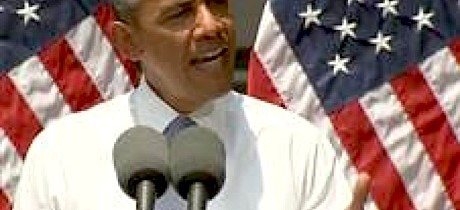Obama on Climate Change: The Trends Are ‘Terrifying’
Seventy-four years ago, a naval battle off this remote spit of land in the middle of the Pacific Ocean changed the course of World War II. Last week, President Obama flew here to swim with Hawaiian monk seals and draw attention to a quieter war — one he has waged against rising seas, freakish storms, deadly droughts and other symptoms of a planet choking on its own fumes.
Bombs may not be falling. The sound of gunfire does not concentrate the mind. What Mr. Obama has seen instead are the charts and graphs of a warming planet. “And they’re terrifying,” he said in a recent interview in Honolulu.
“What makes climate change difficult is that it is not an instantaneous catastrophic event,” he said. “It’s a slow-moving issue that, on a day-to-day basis, people don’t experience and don’t see.”
Climate change, Mr. Obama often says, is the greatest long-term threat facing the world, as well as a danger already manifesting itself as droughts, storms, heat waves and flooding. More than health care, more than righting a sinking economic ship, more than the historic first of an African-American president, he believes that his efforts to slow the warming of the planet will be the most consequential legacy of his presidency.
During his seven and a half years in office, Mr. Obama said, a majority of Americans have come to believe “that climate change is real, that it’s important and we should do something about it.” He enacted rules to cut planet-heating emissions across much of the United States economy, fromcars to coal plants. He was a central broker of the Paris climate agreement, the first accord committing nearly every country to reducing greenhouse gas emissions.
But while climate change has played to Mr. Obama’s highest ideals — critics would call them messianic impulses — it has also exposed his weaknesses, namely an inability to forge consensus, even within his own party, on a problem that demands a bipartisan response.
He acknowledged that his rallying cry to save the planet had not galvanized Americans. He has been harshly criticized for policies that objectors see as abuses of executive power and far too burdensome for the economy.
That has made Mr. Obama’s record on climate curiously contradictory, marked by historic achievements abroad and frustrating setbacks at home. The threat of global warming inspired Mr. Obama to conduct some of the most masterful diplomacy of his presidency, which has bound the United States into a web of agreements and obligations overseas. Yet his determination to act alone inflamed his opponents, helped polarize the debate on climate change and will carry a significant economic cost.
Mr. Obama chalks up the contradictions both to politics and to the amorphous, unseen nature of the threat.
“It feels like, ‘Meh, we can put this off a little bit,’” he said.
The president spoke in a cottage on a Marine base that overlooks Kaneohe Bay in his home state, Hawaii. Angry waves crashed on the rocks below the house, the sea churned by one of two hurricanes spinning close to the island. Hawaii, as one of Mr. Obama’s climate advisers pointed out, normally does not get back-to-back hurricanes.
“When you see severe environmental strains of one sort or another on cultures, on civilizations, on nations, the byproducts of that are unpredictable and can be very dangerous,” Mr. Obama said. “If the current projections, the current trend lines on a warming planet continue, it is certainly going to be enormously disruptive worldwide.”
Fonte: The New York Times



